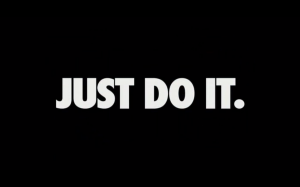Question 1: In 200 words or less please outline your goals, desires – what you want to get out of this semester…
Throughout this semester my main ambition is to push myself creatively – to do the work assigned plus much more. To take risk where I can – to not play it safe. I want to involve myself fully into the course and enjoy the learning journey. I want to take in what is being said and told and use it to my benefit and advantage.
My main goal is pushing my creativity and seeing what I can accomplish – what I can come up with. To work in a group is an exciting yet challenging part in this course (as everyone has a difference idea’s, set of priorities and goals). I want to see the difference in people, listen to their idea’s and be inspired. I sometimes forget that most of this industry is done in teams – and that’s something I really want to explore.
I also want to familiarise myself with the production side – how an idea can come alive. This will take a large amount of dedication and I really want to try my best to listen to others, push myself creatively and learn things that will improve my style and skills. I look forward to creating content and making something of my ideas.
Question 2: Consider Jasmine’s lecture on Screenwriting and briefly describe one point that you have taken from it. A point that excites you, something that was completely new to you, perplexes you or even one you take issue with.
Jasmine made the points of a novelist and a screenwriter – and the fact that there IS a difference. I found this incredibly interesting, and true… A novel has pages and pages of establishing the character to the fine detail – creating a complex image for the reader and really setting the character up on a personal level. Although, yes, you can do this in film – but film has a time limit. There is restrictions and everything you write and ‘set-up’ to make a character can not all be conveyed on screen. It would make the narrative too hard to understand and at times, over-whelming. This is why I really enjoyed Jasmines character summary – what a character can be made up of, what it shouldn’t be and how to make the character interesting. You want the audience to feel something towards the character, something personal, even an association – but you also want the character to be tested to make it interesting and to keep the viewer involved with what they are watching. Setting up your characters is very important as it can establish the audience’s connection with the film and character and make it, as obvious as it seems, watchable.
Question 3: Select from one of the readings from week 1 or 2 and briefly describe two points that you have taken from that reading. Points that excite you, something that was completely new to you.
Reading: Getting An Idea, Robin Plunkett
1. ‘The content of a story told on film will be shaped by the medium itself’ – I sometimes find it very had to contain my idea’s on how I want my imagery filmed, shown and displayed. As I do a lot of photography work, I find my mind focusing on what I think is beautiful, i.e. “pretty pictures”, and I get caught up in the ‘art’ and aesthetics of an image rather than its narrative. I sometimes feel that what I imagine will not suit actual ‘cinema’ or the medium – as it may be too abstract or just visually pleasing (with no story). Plunkett highlights to me that an idea may only be suited to certain mediums – perhaps not cinema. This brought me back to earth – I have to take into account what medium I am using and realise my idea’s may not actually be right for the medium I am using.
2. ‘It’s a study of human behaviour and how people in very special circumstances react to each other’ (Roman Polanski) – I honestly love this. I have always found it inspiring what a film can actually convey and how it can make me feel. Its fascinating how a person can become so attached to a character, to their journey, and how we can familiarise it with ourselves. The emotions a film can evoke from the creations of characters and how they react and behave is outstanding – because it’s something we face every day. We are faced with certain people and situations in our lives that we will have to deal with and every time react to in different ways and individually – and for a film to highlight a journey, emotions and consequences is amazing and we find ourselves empathising and fascinated – even attached.
